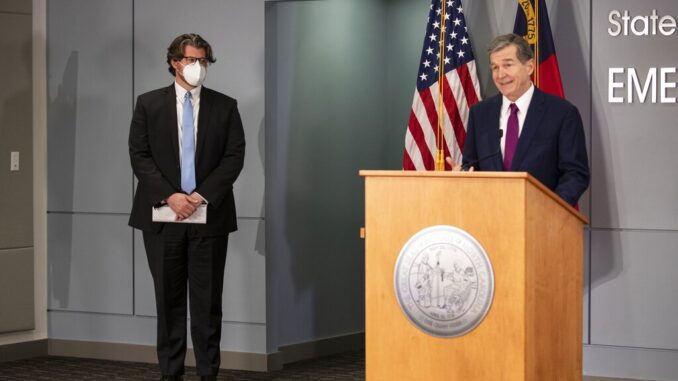
RALEIGH — During a Jan. 4 COVID-19 briefing, Gov. Roy Cooper announced he would be extending a previous executive order requiring vaccination or testing for certain state employees.
“This week, I’ll extend Executive Order 224 which requires vaccines or testing of state employees,” Cooper said. “When I extend the order, the Office of State Human Resources will have the authority to include boosters in the definition of being up to date on vaccines when CDC takes that action.”
The announcement came as Cooper’s statewide COVID-19 state of emergency order turns 665 days old.
Under Executive Order 224, all state employees falling under cabinet-level authority were required to either provide proof that they are fully vaccinated or be tested at least once a week for COVID-19.
Executive Order 224 expired Aug. 31, 2021, however, the State Office of Human Resources put policies in place that began Sept. 1, 2021. State employees refusing to comply with the policies could be disciplined or fired. The extension is effective immediately and will expire April 5, 2022.
Executive Order 224 originally defined fully vaccinated as someone who is two weeks out from having received the second dose in a two-dose COVID-19 vaccine series (Pfizer or Moderna), or someone two weeks from a single-dose COVID-19 vaccine (Johnson & Johnson).
Under the extension, OSHR “will be given the authority to include boosters in the definition of fully vaccinated when appropriate.”
Cooper was asked if he is tracking state employee booster shots with regard to extending his executive order. He said that when the CDC makes that decision that boosters are part of the new definition of fully vaccinated that his order will reflect that as “part of the requirement for state employees.”
Cooper also urged the public to get vaccinated or to get a booster shot. He said that he and his family have received booster shots. He also said that vaccination “is the strongest protection we have to fight this virus and live normal lives” and made the claim that “most people with COVID in the ICU right now is unvaccinated.”
Interim N.C. Department of Health and Human Services (NCDHHS) Secretary Kody Kinsley also claimed that “over 87% of individuals in the hospital right now are unvaccinated.”
Only one reporter asked about the emerging new oral antiviral treatments. There were no direct questions about the state’s supply of Monoclonal Antibody treatments despite increasing complaints from numerous states that the Biden administration has severely cut off their supply of those treatments.
In previous briefings, Cooper had indicated that the state’s supply of monoclonal antibody treatments was ample, but in the Jan. 4 briefing he said all COVID treatments are in “very limited supply.” Kinsley also made a statement about limited supply.
“Because supply is limited per federal guidance, treatments will be used for those at highest risk of severe disease,” said Kinsley. He added the best treatment is “prevention” and urged the public to get vaccinated or boosted right away.
During questions from the media, Kinsley was asked about the ‘scramble for testing’ and he said they anticipated continued elevated levels of demand for testing.
Cooper admitted there were a “record number of tests” administered over the holidays. He later said that two additional rapid tests have been authorized by the FDA and will put “millions more” tests on the market.
Kinsley said that both NCDHHS COVID guidance and the StrongSchoolsNC Toolkit had been updated with the latest CDC information, which includes reduced quarantine length. He also said they are continuing to review adding “Test to Stay” policies to the toolkit.
The NCDHHS interim secretary also said that according to the CDC, North Carolina is the “red” level of transmission and that everyone should be wearing a “well-fitted” and “multi-layered” mask.
Kinsley then suggested wearing surgical masks like a KN95 or N95. He said NCDHHS is making those type of masks available “at no cost” for adults such as those associated with long-term care facilities, school staff and “migrant farm workers.” Qualifying individuals get request the masks through NCHHS’ website.
Both Cooper and Kinsley said they are watching hospital capacity. Kinsley made the claim that the majority of the state’s hospital and ICU beds were being used by COVID patients.
“As of today, 3,008 people are hospitalized with COVID-19 and 603 people are in the ICU. That’s 80% of our hospital beds and 85% of our ICU beds,” Kinsley said.
No one questioned Kinsley on those percentages, which do not appear to line up with the data on the NCDHHS COVID-19 dashboard.
As of Jan. 3, with 95% of hospitals reporting, 16,040 inpatient beds are in use. There are also 3,996 empty staffed beds and 5,430 empty unstaffed or unreported beds.
Using Kinsley’s figure of 3,008 COVID patients and 16,040 inpatient beds in use, that’s a rate of 18.75%. Counting occupied beds and empty but staffed beds is a capacity rate of just over 15%. Taking all bed counts together, it’s an 11.81% usage rate.
The same is true for Kinsley’s claim on ICU beds.
As of Jan. 3, there are 1,895 ICU beds in use, 322 empty staffed beds, and 1,270 empty unstaffed or unreported beds.
Of the 1,895 ICU beds in use, 603 patients comes to 31.82%. Adding the staffed empty beds, the rate drops to 27.19%. When combining all bed options, the percentage drops further, to 17.29%.



